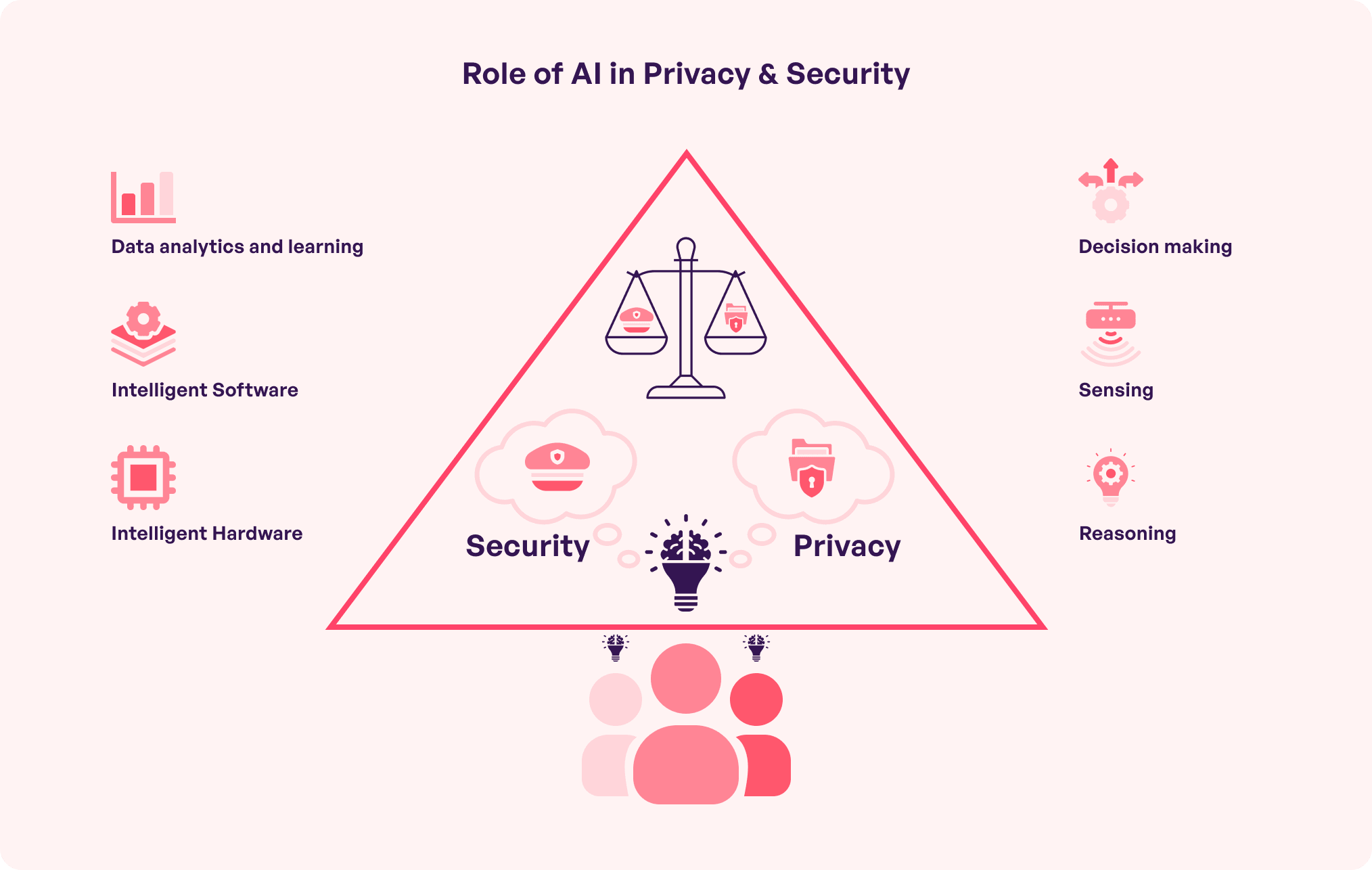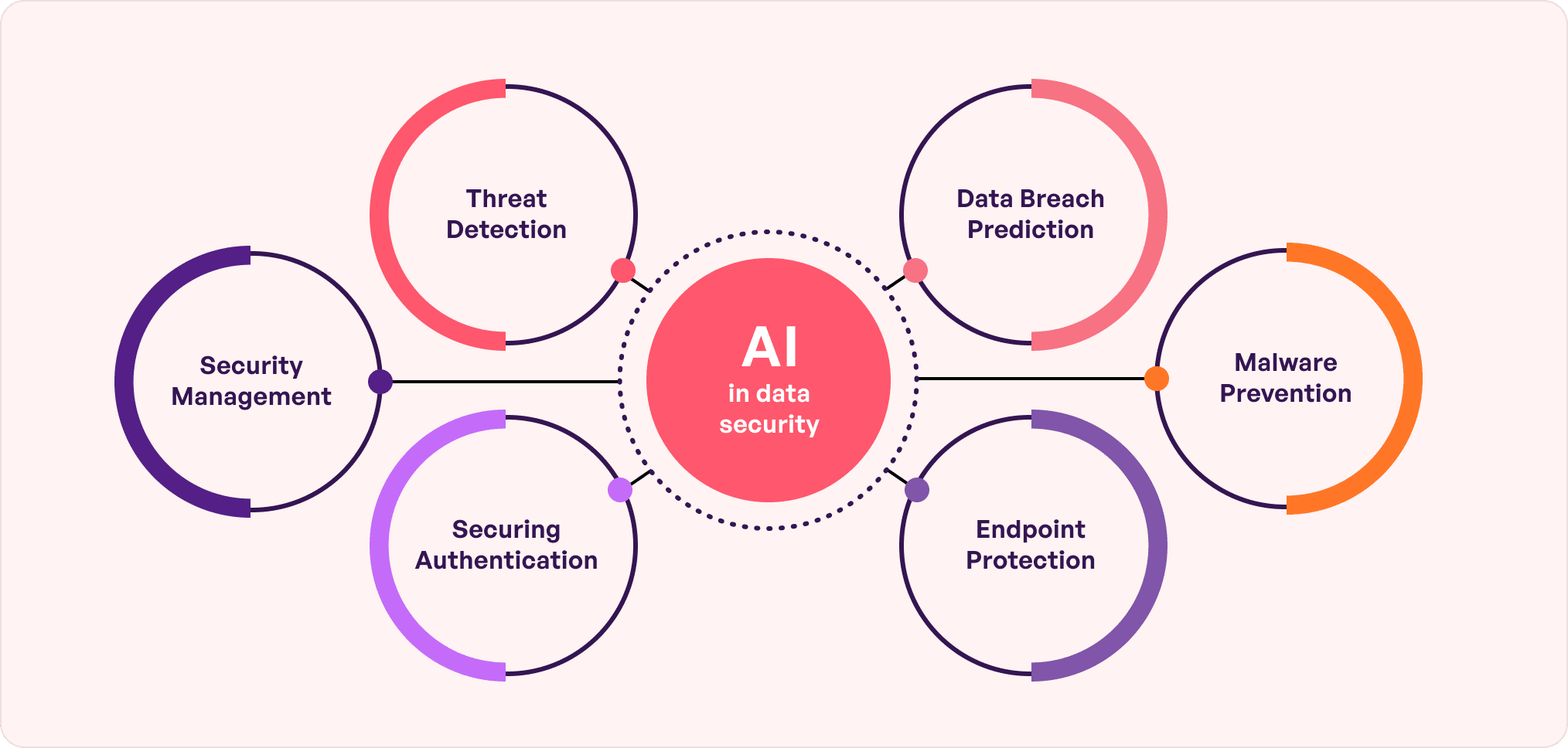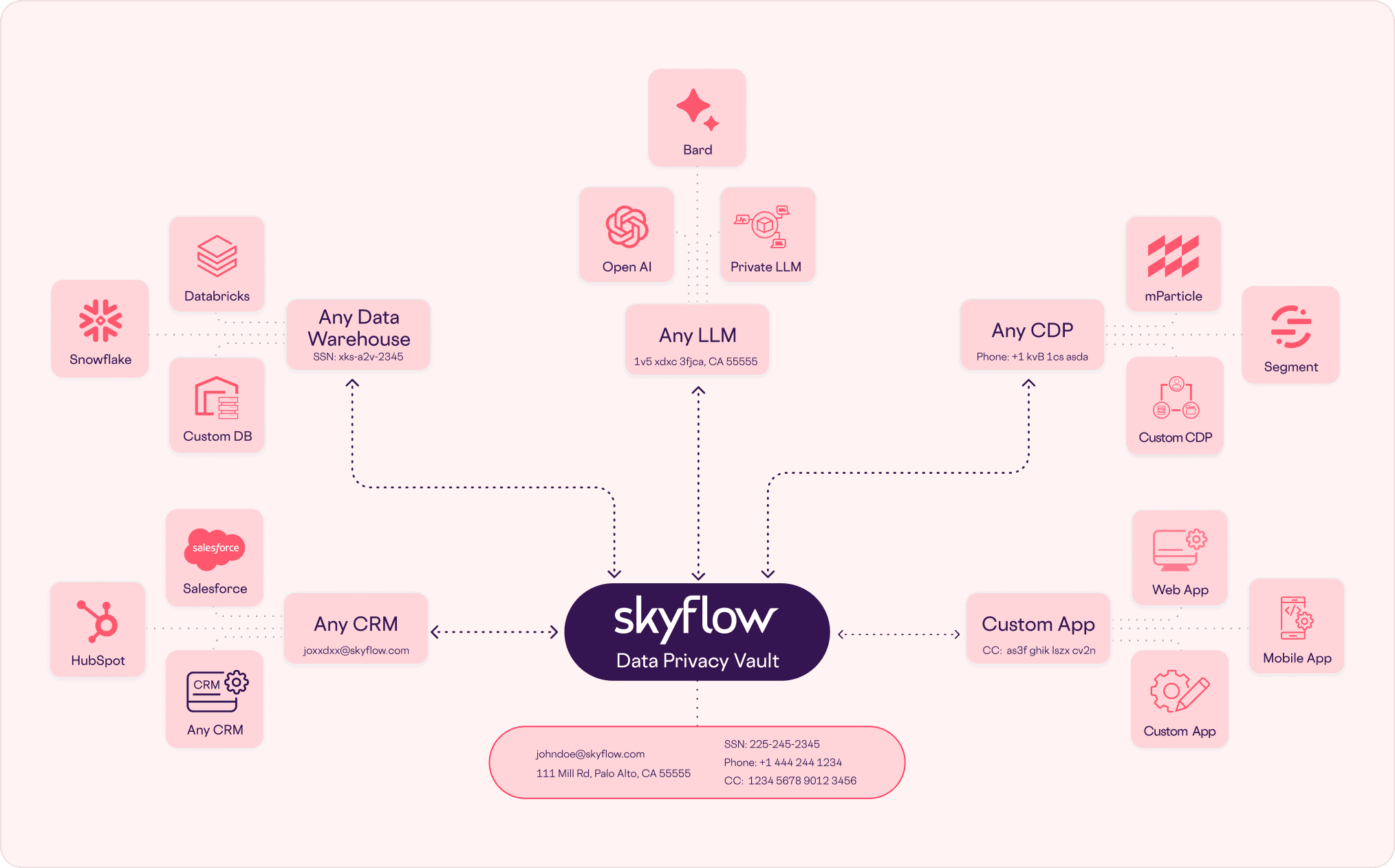AI became popular in the 1980s when the first conference of the Association for the Advancement of Artificial Intelligence (AAAI) was held at Stanford. Yet the real boom skyrocketed around 2020 due to research breakthroughs and government funding. Studies found that 52% of companies accelerated the adoption of AI in their action plans during the coronavirus pandemic. Now, 73% of US companies have generally adopted artificial intelligence in a few areas. No wonder in 2024, it is highly predicted to change how businesses are operating. This would be in terms of, but not limited to, AI in data privacy, revenue, operations, and creating profitable business models.

However, we need to understand that a portion, out of the tons of generated data, is marked sensitive. This data can be used to identify individuals and must be isolated and protected at any cost to prevent a serious fraud risk.
Enter data privacy vault. This technology tightly secures and monitors the usage of sensitive data in a safe and sophisticated manner. Integrating this architecture into your existing stack is not just critical on the security front, but we believe will be made mandatory on a regulatory level as well. Let’s learn about data privacy in the AI landscape and how it works in reference to Skyflow. Read on.
Table of contents
Significance of AI in data privacy
When we talk about data privacy and security, AI-driven solutions are becoming critical to the success of organizations. This is because it has a use case in several verticals like machine learning for anomaly detection, secure model deployment, behavioral analytics, and real-time monitoring. Here’s an overview to understand how AI fine-tunes the security process:
- Encryption: AI is a game-changer in this field. It helps adjust security in real-time and autonomously. So, even when cyber threats are on the rise, your data is highly secured since the privacy is updated without the need to supervise. AI identifies unusual behaviors and patterns with advanced threat-detection capabilities and provides mitigation responses accordingly. This automatically increases the trustworthiness of AI- insights.
- Tokenization: Tokens refer to a digital and anonymous version of something real. AI contributes to tokenization by detecting suspicious patterns while improving efficiency and protecting against potential threats. This interplay of AI and data privacy or tokenization is crucial in certain environments, like a fintech landscape, where security is non-negotiable.
- Anomaly Detection: In simple terms, AI makes data-driven predictions by learning from previous outcomes. It uses three different methods for detection: supervised anomaly detection, unsupervised anomaly detection, and semi-supervised anomaly detection. Post this, it raises fraud alerts.

- Predictive Analysis: Incorporating AI in predictive analysis means leveraging its ability to analyze millions of data within a few minutes. In a business, it is related to verticals like marketing, sales, and customers in industries like healthcare and finance. The key components of AI-based predictive analysis include data, algorithms, and predictions. In short, it works on the ‘what comes next’ principle.
- NLP: Natural Language Processing is a branch of AI that helps computers understand and generate texts like humans. NLP, and its sub-domains like Natural Language Understanding (NLU) and Natural Language Generation (NLG) are the technologies behind Alexa, Siri, and Cortana. They understand and generate human-like languages, respectively. Combining AI and NLP can boost threat detection capabilities to help systems become more efficient.
- Threat Intelligence: AI can analyze vast databases and spot abnormal trends, patterns, and suspicious deviations from standard operations. Advanced algorithms can further detect malware, ransomware, viruses, and vectors seamlessly. This helps protect companies from going into a cyber debt in their IT infrastructure.
Enhancing API security with AI
AI applied strategically and methodically can be used to refine API security. Here’s the top 3 areas where it benefits significantly:
Secure coding: AI in itself is quite necessary in building APIs. This is because it helps generate high-end secure codes which translates into a strong foundation. In fact, the efficiency of AI in coding has already been highlighted in the 2023 Snyk AI-Generated Code Security Report which proves the statement.
Identify threats in real-time: Suspicious clients and users are potential threats. With the help of artificial intelligence, API end-points of their interactions can be analyzed. Based on activities, their allotted threat level will rise and fall. If the levels do not match the expected use case, it can be marked as a red flag.
Layer 7 DDoS protection: Almost 40% of businesses feel that DDoS is a growing threat to them. The good news is that AI can mitigate it! The DDoS protection is usually valid till layers 3 and 4. However, AI can help protect against abuse in layer 7 by alerting against breaches. Overall, this improves API security to a great extent.
What is Skyflow data privacy- an introduction
Skyflow is an API-based data privacy vault. It can be integrated with any tech stack at scale. This makes it easy to ensure stringent privacy policies across LLMs, apps, or data cloud. Skyflow has been designed to protect and govern sensitive data, no matter where it is located in your organization. Other usages of this data privacy API across your organization include:
- Analytics
- Support, and
- Marketing
Global policies and granular access controls in Skyflow make sure encrypted data is ‘at rest, in transit, and in memory.’ This kind of proprietary encryption allows data protection without hampering usability for distributed teams like customer service or marketing.

AI integration in the vault privacy of Skyflow
Below is a basic overview of how Skyflow AI in the data privacy vault works.
Protect PCI: Skyflow helps offload compliance requirements by eliminating all PCI data from an environment. Disparate point solutions here can be replaced with a single vault. This allows organizations to seamlessly reduce fraud, control payment data, and modernize the payment stack. In fact, Skyflow has also launched a GPT privacy vault which enables organizations to securely leverage the power of large language models and a prominent framework of generative AI. It delivers significant value to specific areas like online travel bookings and pharmaceutical research.
Encrypted Data Analytics: Organizations can now protect their precious data without cutting down on secure distribution. Well, how? Syflow allows the de-identification of sensitive data and keeps it out of the analytics pipeline. You can safely use tokens in this pipeline. Ultimately, this keeps you ahead of privacy and compliance – the same zero-trust vault approach that is followed by Netflix and Apple.
Encrypted Data Analysis: Organizations can decide how data is displayed to customers – hiding a part, showing the full version, or completely removing everything. This does not affect data usability. Further, query-sensitive customer data can be kept secure while the following can be done:
- Analyze customer behavior
- Build secure data triggers
- Build machine learning models
Besides these comprehensive features of the data privacy vault, no additional compliance or development procedures are needed. The Skyflow vault lets you ‘extract, protect, and process’ sensitive data using custom code. This way, you have the flexibility to handle data in the most suitable way to sustain your requirements.
AI Solutions like Skyflow
Skyflow promises multiple benefits of using data privacy vaults for different industries. Find out below:
Fintech data privacy vault
Product development is accelerated while easing data privacy, security, and compliance (PCI, CCPA, and GDPR). This is as easy as an API. A few benefits are simple integration helps remove all PCI and PII data from your environment, secure integrations and workflow, and fewer complexities.
Healthcare data privacy vault
Security and PHI data privacy – these are offered and innovated with a simple API. Further, a HIPAA-based vault can leverage AI to boost security and maintain healthcare compliance to avoid legal repercussions. The vault also comes with plenty of impressive built-in features like masking, redaction functions, and data tokenization.
Simublade is a robust app development company that takes things further when compared to a simple API ecosystem like Skyflow’s. We integrate blockchain, AR/VR, and IoT too along with stringent cybersecurity solutions. This includes compliance assessment and consulting, cloud migration, vulnerability management, multi-factor authentication, endpoint detection & response, and disaster recovery plan. All of these combined make fintech and healthcare interoperable, secure, and most importantly, global.
The future of AI data privacy
AI and data privacy will go hand-in-hand in the future. It will be more about improved regulation, more investment, and better structure to ensure high-end use security and experience. This means leveraging cutting-edge technology for advancement in anonymization, encryption, and overall protection methods. For instance, the future will see the implementation of automated incident response systems.
Further, AI is predicted to penetrate into several areas like :
- Security policy management
- Strengthening end-point security in company infrastructure, and
- Revolutionizing AI-based encryption techniques.
Having a clear understanding can help both big and small enterprises make informed choices when getting an app built or simply maximizing their existing cybersecurity services.
At Simublade, we offer exceptional AI solutions -whether it is healthcare, fintech, or the SaaS industry. We understand that startups can scale faster while enterprises can make predictive decisions. We have helped businesses across a range of industry verticals achieve their goals 3X faster. We run tests on all new cases, tools, techniques, and algorithms to make sure we grow alongside the ever- evolving data privacy in the AI landscape. Connect with us to build something similar to Skyflow.
FAQs
Q. What are the privacy issues with generative AI?
Ans. Generative AI applications face the issue of exfiltration attacks. This means unauthorized people can access sensitive information. Generative AI tools can also spread misleading data and conspiracy theories. No wonder nearly 27% of organizations have banned the use of generative AI at the workplace over security risks.
Q. What is an AI data privacy vault?
Ans. This is a data modeling technology. In simple terms, it is a ‘highly fortified’ and secured vault or centralized repository. Here companies can store, tokenize, encrypt, separate, and manage their sensitive database. You can get a custom vault or a similar technology created as per your needs with passcodes and SSNs.
Q. How does a data vault work?
Ans. A privacy vault has centralized IP and several levels of access management. This way information is tightly secured. It can further handle data structure variations, record data history, detect suspicious activities, and ultimately prevent data leaks. In a privacy vault, data can only be used in a ‘privacy-preserving’ way.
Q. Can you integrate a data privacy vault in the existing stack?
Ans. Yes, an AI data privacy vault can be added to a particular technology or data stack.
Q. Why do organizations need a data privacy vault?
Ans. Data privacy vaults in an organization will help protect information. This will ultimately prevent cyber attacks like identity theft, data misuse, and ultimately, reputation damage.





